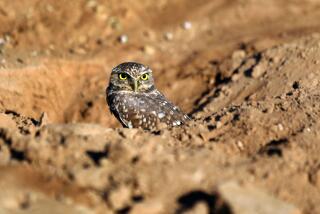Tricolored blackbird gains endangered species protection in California
The California Fish and Game Commission on Wednesday granted endangered species protections to the tricolored blackbird, approving the designation on a temporary, emergency basis.
The reason: Statewide surveys show the tricolored blackbird population has plummeted 64% in six years. The population stood at 395,000 in 2008 and is down to about 145,000 this year, the smallest population ever recorded.
The back story: Tricoloreds were once among the most common birds in California, with vast colonies of the colorful and highly gregarious species nesting and foraging in marshes and rangelands. Over the last two decades, the birds have adapted to losses of habitat by nesting in dairy silage fields.
Today, they cling to existence in a small number of large colonies in dairy lands where insects they depend on are suppressed and nesting grounds are routinely destroyed through the harvesting of grain fields.
The remedy: “It’s crucial that harvesting and plowing activities on private lands used for tricolor breeding are prohibited or delayed during the upcoming 2015 nesting season and that prohibitions on shooting are enforced,” said Jeff Miller, a wildlife advocate for the Center for Biological Diversity, which filed the petition for emergency listing.
The fallout: The declaration will come at a cost to dairy farmers and their crops, warned Noelle G. Cremers, director of natural resources and commodities for the nonprofit California Farm Bureau Federation.
“It could mean losses in the tens of thousands of dollars for an individual farming operation if the birds have colonized its fields,” Cremers said.
Audubon California and the U.S. Department of Agriculture’s Natural Resources Conservation Service are leading a program that pays dairy farmers to delay harvesting their silage crops through the nesting season. So far, however, that program has failed to stem the decline.
The future: Under the emergency listing, the first ever approved by the panel, the bird will be fully protected for six months, after which the listing may be renewed for another six months.
The state Department of Fish and Wildlife is reviewing a petition filed by the Center for Biological Diversity to protect tricoloreds on a permanent basis and impose limits on activities that kill or injure them.
“I don’t know if the tricolored blackbird is going to follow the passenger pigeon” into extinction, Richard Rogers, one of three commissioners who voted in favor of the protection during a hearing in Van Nuys, said. “But on my watch, I don’t want that to happen.”
The shooters: Some biologists believe that a ban on shooting red-winged blackbirds in autumn rice fields would save untold numbers of tricoloreds, which are killed by mistake because the species are nearly identical in appearance and often flock together.
[email protected]
Twitter: @LouisSahagun






